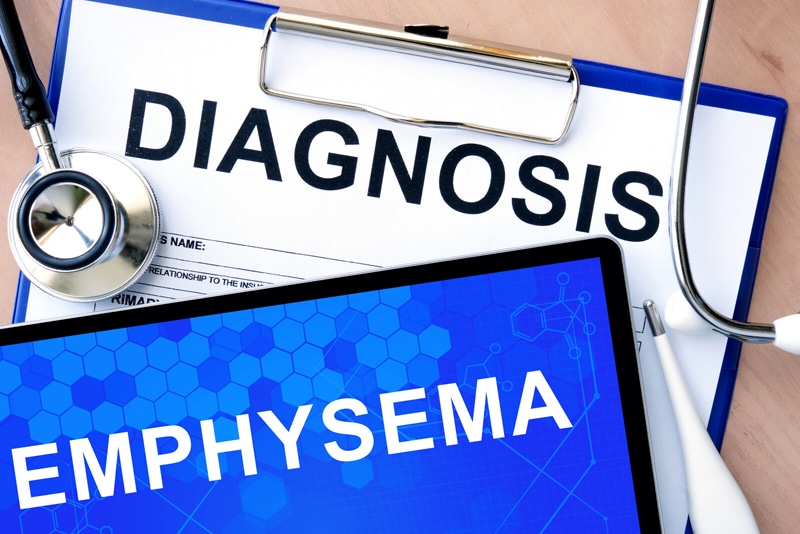Emphysema is a long-term, progressive disease of the lungs that primarily causes shortness of breath. In people with emphysema, the air sacs (the inner walls of the lungs-alveoli) get damaged, stretched and rupture – creating larger air spaces. This in turn reduces the surface area of the lungs and the amount of oxygen that reaches your blood stream. Regarded as a type of chronic obstructive pulmonary disease (COPD), the condition can cause chronic cough and difficulty in breathing. Generally, people with emphysema also have chronic bronchitis (inflammation of the bronchial tubes) which leads to persistent cough. Long-term exposure to air-borne irritants including – tobacco smoke, marijuana smoke, air pollution and other chemical fumes and dust are the main factors that cause the obstructive pulmonary disease. Treatment for this condition is based on the type of symptoms – whether mild, moderate or severe. Treatment includes medications, the use of an inhaler, respiratory assistance and possibly surgery to prevent complications. There’s no cure for emphysema, but quitting the habit of smoking or reducing exposure to second-hand smoke can help control symptoms in a better manner. Physicians’ practices dealing with patients suffering from emphysema need to know the ICD-10 codes to report this condition correctly. Outsourced medical billing services from a reputable medical billing company can help in accurate and timely claim filing for appropriate reimbursement.
Reports suggest that about 3.5 million people, or 1.5 percent of the US population, received a diagnosis of emphysema in 2016. The number of deaths involving emphysema was 2.3 people in every 100,000. In most cases, men are more likely to develop emphysema than women. The exact reason for this is unknown, however differences between male and female hormones are suspected. Older age is one of the prominent risk factor for emphysema. Lung function normally declines with age. Therefore, the older the person, the more likely they will have enough lung tissue destruction to produce emphysema.
What Symptoms Occur?
In most cases, emphysema develops slowly. A person can have the condition for many years even without any noticeable signs and symptoms. Two of the key symptoms of emphysema are shortness of breath and a chronic cough – which appear in the early stages. Shortness of breath may be experienced only during physical exertion, but as the disease progresses, it can occur when the patient is resting as well. Other additional symptoms that can occur during the later stages of the disease include –
- Frequent lung infections
- Wheezing
- Sleep problems
- Reduced appetite and weight loss
- Fatigue
- Blue-tinged lips or fingernail beds, or cyanosis, due to a lack of oxygen
- Anxiety and depression
- A lot of mucus
- Morning headaches (due to a lack of oxygen, when breathing at night is difficult)
When to Seek Medical Treatment?
If a person experience worsening shortness of breath, it is important to seek medical attention. As breathing problems can also occur with other diseases, (particularly heart disease and other lung diseases), it is important not to overlook or minimize this symptom. In addition, a gradual increase in the ability to exercise or perform daily activities, a persistent cough and wheezing problems should also suggest a regular visit to the physician.
In order to diagnose whether you have emphysema, physicians will conduct a detailed review of your medical history and do a physical examination. A wide variety of imaging tests like – chest X-ray, Computerized tomography (CT) scans will be conducted to correctly diagnose the root cause of shortness of breath. Lung function tests may also be conducted to measure how much air your lungs can hold and how well the air flows in and out of your lungs. In addition, blood tests may be conducted to determine how well your lungs transfer oxygen into, and remove carbon dioxide from, your bloodstream.
There is no specific cure for emphysema. However, treatment can help relieve the symptoms and slow the progression of the symptoms. Treatment for this type of chronic obstructive pulmonary disease (COPD) may include a combination of medications and other therapies. Depending on the severity of symptoms, pulmonologists and other specialists may suggest medications like – bronchodilators, inhaled steroids and other antibiotics to help relieve shortness of breath. Therapies include – Pulmonary rehabilitation (breathing exercises and techniques), nutrition therapy (advice about proper nutrition), and supplemental oxygen therapy. In severe or advanced cases of emphysema, surgery will be considered as a last option and these include – lung volume reduction surgery (LVRS) and lung transplantation. Treatment procedures and other tests performed by pulmonologists or other specialists must be carefully documented using the correct medical codes. Medical billing and coding outsourcing services provided by established medical billing companies can help physicians use the correct codes for their billing purposes.
ICD-10 Codes for Diagnosing Emphysema include –
- J43 – Emphysema
- J43.0 – Unilateral pulmonary emphysema [MacLeod’s syndrome]
- J43.1 – Panlobular emphysema
- J43.2 – Centrilobular emphysema
- J43.8 – Other emphysema
- J43.9 – Emphysema, unspecified
Preventing Emphysema
Prevention of this pulmonary disease is closely linked with the prevention of the habit of smoking or avoiding breathing or exposure to second-hand smoke. The primary risk factor for the occurrence of the condition is – smoking of cigarettes – active smokers are at increased risk of suffering from this condition. For individuals that have emphysema caused by other respiratory irritants – avoiding polluted environment is the best first step toward prevention. People who work with chemical fumes, dust or other pollutant environments need to wear a mask to protect their lungs.
Medical billing and coding for emphysema can be challenging, as there are several codes associated with the condition. By outsourcing these tasks to a reliable and established pulmonary medical coding company (that offers the services of AAPC-certified coding specialists), healthcare practices can ensure correct and timely medical billing and claims submission.




